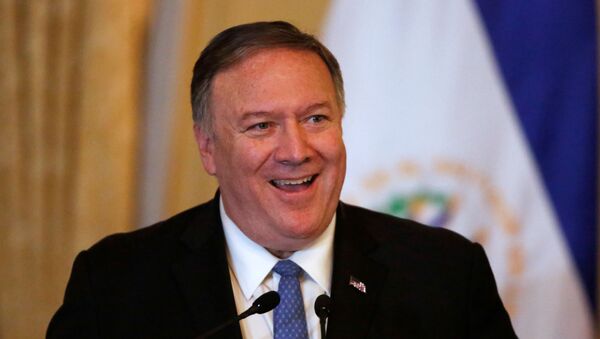The US was not sending Huawei Technologies "mixed messages" and the US Commerce Department's blacklist of the Chinese telecoms giant would not prevent striking a new trade deal with Beijing, US secretary of state Mike Pompeo said on Tuesday.
In an interview with CNBC's Squakbox, Pompeo said that he did not think “there’s a mixed message at all,” and that the “threat of having Chinese telecoms systems inside of American networks or inside of networks around the world presents an enormous risk, a national security risk".
When asked whether Chinese president Xi Jinping was trying to buy more time in negotiations, the Secretary said that it had "not been our experience" and that it was not "what's happening today".
“I think he’s prepared to engage in a complex set of trade negotiations,” Pompeo said in his interview. “So, no, he hasn’t walked away, he hasn’t said ‘I won’t talk if you do these things.”
But Mr Pompeo added that the world was "late to the game" and that Chinese telecoms giants such as Huawei, ZTE and others had been given a 'jump start' on providing the US and its allies IT supplies for their networks, and that it would take time to 'unravel' from Chinese telecoms firms.
“There’s enormous costs in some of these transitions," Mr Pompeo said. "You can’t rip and tear it all up at once".
He added that that US efforts were to "put together a pathway where ... the risk from Chinese Communist Party-connected telecom companies isn’t present in the United States or the trusted networks in which the United States participates all over the world.”
Beijing and Washington Spar Over Huawei's Future Trade Relationships
Mr Pompeo's statements come just hours after Huawei Technologies had been granted an extension by the US Commerce Department, allowing it to buy supplies from US companies, according to sources speaking to Reuters.
The news comes as prospects of the extension were floated amongst US officials as US president Donald Trump continued his trade war on China, citing intellectual property theft and securing ‘national security’.
But the extension comes as a former agreement was set to expire in August, which also grants Huawei the right to keep existing telecom networks across the US, as well as allowing Google to continue providing Android updates to Huawei mobiles.
— Global Times (@globaltimesnews) August 20, 2019
President Trump and Chinese president Xi Jinping are expected to hold talks over the telephone this weekend to discuss the ongoing US-China trade war, where President Trump has been using the licences as a bargaining chip in negotiations with Beijing and could change before the agreement expires on Monday, according to one of the sources.
— Sky News Tech (@SkyNewsTech) August 15, 2019
The US trade war on China has escalated in recent months, with President Trump announcing in September that he would proceed with a further 10 percent in tariffs on an additional $300bn in Chinese imports, covering all trade with Beijing, with Chinese officials retaliating by halting purchases of US agricultural products. Trump has made some concessions after meeting President Xi on the sidelines of the G20 meeting in Osaka in June, where Washington agreed to let Chinese firms sell components and spare parts not deemed to be a threat to national security. But the US continues to routinely accuse Huawei of spying for the Chinese government, which both Beijing and Huawei have repeatedly and adamantly denied.
— Bloomberg TicToc (@tictoc) August 18, 2019
Huawei is taking its own measures in addition to Beijing's reciprocal tariffs, including launching its HarmonyOS operating system in August and plans to reveal its Map Kit mapping software in October, which aims to replace Google's Android if the latter restricts future access to updates for Huawei devices, as well as for other components and equipment. Huawei has also launched plans to build a £1.2bn research and development facility in Shanghai to reduce dependency on US processors and components following Intel, Qualcomm, Broadcomm, Microsoft, Apple and other tech giant's decision to comply with US sanctions against the Chinese multinational.




